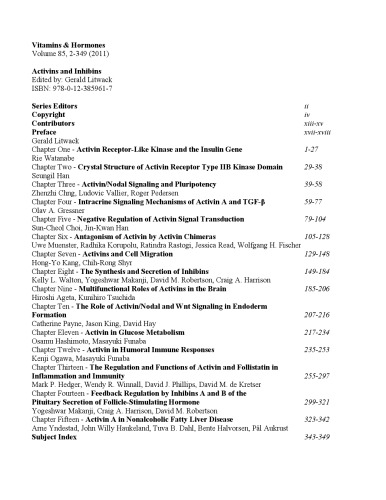

Most ebook files are in PDF format, so you can easily read them using various software such as Foxit Reader or directly on the Google Chrome browser.
Some ebook files are released by publishers in other formats such as .awz, .mobi, .epub, .fb2, etc. You may need to install specific software to read these formats on mobile/PC, such as Calibre.
Please read the tutorial at this link: https://ebookbell.com/faq
We offer FREE conversion to the popular formats you request; however, this may take some time. Therefore, right after payment, please email us, and we will try to provide the service as quickly as possible.
For some exceptional file formats or broken links (if any), please refrain from opening any disputes. Instead, email us first, and we will try to assist within a maximum of 6 hours.
EbookBell Team

4.4
42 reviews
ISBN 10: 0123859617
ISBN 13: 9780123859617
Author: Gerald Litwack
First published in 1943, Vitamins and Hormones is the longest-running serial published by Academic Press. The Editorial Board now reflects expertise in the field of hormone action, vitamin action, X-ray crystal structure, physiology, and enzyme mechanisms.
Under the capable and qualified editorial leadership of Dr. Gerald Litwack, Vitamins and Hormones continues to publish cutting-edge reviews of interest to endocrinologists, biochemists, nutritionists, pharmacologists, cell biologists, and molecular biologists. Others interested in the structure and function of biologically active molecules like hormones and vitamins will, as always, turn to this series for comprehensive reviews by leading contributors to this and related disciplines.
Chapter 1: Activin Receptor-Like Kinase and the Insulin Gene
I. Introduction
II. TGF-beta Family Receptors: ALK
III. Activin Isoforms A, B, and AB
IV. Nodal
V. Insulin Gene Regulation
VI. Conclusion
Acknowledgments
References
Chapter 2: Crystal Structure of Activin Receptor Type IIB Kinase Domain
I. Introduction
II. Type I Receptor Kinase Domain Structures
III. 3D Structure of ActRIIB
IV. Conclusion
References
Chapter 3: Activin/Nodal Signaling and Pluripotency
I. Introduction
II. Conclusion
References
Chapter 4: Intracrine Signaling Mechanisms of Activin A and TGF-beta
I. Common TGF-beta and Activin A Signaling and Target Genes: Focusing on CTGF/CCN2
II. The Early Response to Cellular Stress: Intracellular Activation of TGF-beta
III. Continuous Low-Level Activation of Activin A/TGF-beta Target Genes
IV. Intracrine Signaling: General Aspects
V. Intracrine Signaling of TGF-beta: The Stimulatory Pathway
VI. Intracrine Signaling of TGF-beta: The Inhibitory Pathway
VII. Intracrine Activin A Signaling
VIII. Conclusion
References
Chapter 5: Negative Regulation of Activin Signal Transduction
I. Introduction
II. Extracellular Antagonists
III. Negative Regulation of Activin Receptor Function
IV. Inhibitory Smads
V. Interfering with Smad Function
VI. Negative Regulation of Gene Transcription
VII. Conclusions
Acknowledgments
References
Chapter 6: Antagonism of Activin by Activin Chimeras
I. Introduction
II. The Activin/BMP Receptor System
III. Design of Chimeras
IV. Assessment of Binding and Biological Properties of Chimeras
V. Summary, Conclusions, and Future Directions
Acknowledgments
References
Chapter 7: Activins and Cell Migration
I. Introduction
II. Molecular Mechanism of Activin Signaling Regulated Cell Migration
III. The Role of Activins in the Regulation of Tumor Cell Migration and Metastasis
IV. The Role of Activins in the Modulation of Immune Cell Migration
V. Conclusion and Future Prospective
Acknowledgments
References
Chapter 8: The Synthesis and Secretion of Inhibins
I. Introduction
II. Inhibin Expression and Regulation
III. Expression Profile of Inhibin in Human Tissues
IV. Inhibin Assembly
V. Circulating Inhibin Forms
VI. Concluding Remarks
References
Chapter 9: Multifunctional Roles of Activins in the Brain
I. Introduction
II. Expression Pattern of Activin and Activin Receptor in the Brain
III. Activin Receptor and its Regulatory Proteins
IV. Functions of Activins in the CNS
V. Conclusion and Perspectives
Acknowledgments
References
Chapter 10: The Role of Activin/Nodal and Wnt Signaling in Endoderm Formation
I. Introduction
II. TGFbeta Signaling
III. WNT/beta-Catenin Signaling
IV. Applied Biology
V. Conclusions
Acknowledgments
References
Chapter 11: Activin in Glucose Metabolism
I. Introduction
II. Activin Activity in Insulin-Producing and Insulin-Sensitive Tissues
III. Activin in Adipose Tissue Inflammation
IV. Conclusions and Future Directions
Acknowledgments
References
Chapter 12: Activin in Humoral Immune Responses
I. Introduction
II. Activin A in Th2 Cells
III. Activin A in B Cells
IV. Activin A in Macrophages
V. Activin A in Mast Cells
VI. Conclusions and Future Directions
References
Chapter 13: The Regulation and Functions of Activin and Follistatin in Inflammation and Immunity
I. Introduction
II. Molecular Biology of Activin
III. Production and Regulation of Activin and Follistatin
IV. Activin Actions
V. Conclusions
References
Chapter 14: Feedback Regulation by Inhibins A and B of the Pituitary Secretion of Follicle-Stimulati
I. Introduction
II. Structure, Mechanism of Action, and Function of Inhibins and Activins
III. Inhibins A and B Mediated FSH Suppression in Males and Females
IV. Understanding the Increased Potency of Inhibin B In Vivo and In Vitro
Acknowledgments
References
Chapter 15: Activin A in Nonalcoholic Fatty Liver Disease
I. Introduction
II. Nonalcoholic Fatty Liver Disease
III. Activin A in Liver Biology and Pathology
IV. Activin A in NAFLD
V. Conclusion and Future Perspectives
intra ovarian roles of activins and inhibins
activin and inhibin
activin and inhibin secreted by
activin and inhibin function
activin a and b